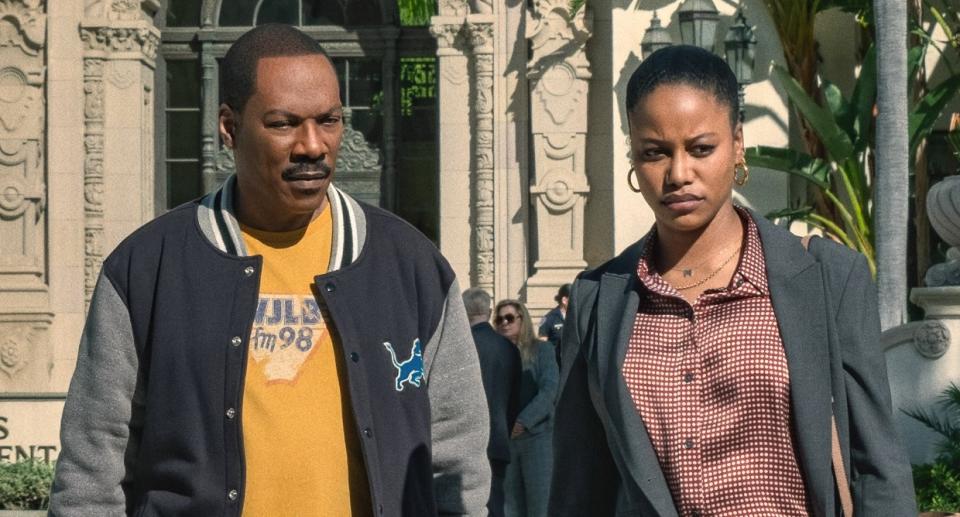‘Beverly Hills Cop: Axel F’ Review: Eddie Murphy Shines in a Netflix Sequel That Gets the Job Done

A renegade cop who refuses to play by the rules or pay any mind to the ungodly amount of collateral damage he causes in the name of saving Los Angeles from its own systemic rot, Axel Foley makes so much sense as the hero of a Netflix movie that it’s hard to believe the company didn’t invent him itself. Maybe that helps to explain why “Beverly Hills Cop: Axel F” feels sturdier and more self-possessed than your average straight-to-streaming legacy sequel, including Eddie Murphy’s own “Coming 2 America.” Here is a story of — and about — the diminished but enduring power of a classic brand in modern Hollywood (or at least the greater Hollywood area), and the moral of that story boils down to a simple idea: Familiarity is such a powerful force that it can inspire people to forgive pretty much anything.
For better or worse, there’s no denying that “Axel F” displays the courage of its own convictions. It’s been 40 years since the first “Beverly Hills Cop” hit theaters (and 30 years since John Landis’ “Beverly Hills Cop 3” shit the bed so hard that it instantly stalled out one of Hollywood’s most profitable franchises), but watching Axel Foley drive around Detroit as Glenn Frey’s “The Heat Is On” blares over the soundtrack tells makes it feel like no time has passed — first-time director Mark Molloy might have been something of a wild card, but returning superproducer Jerry Bruckheimer was there to ensure a bone-deep sense of franchise continuity.
More from IndieWire
It doesn’t hurt that Murphy has aged a lot better than much of the world around him, or that he slips right back into his most explosive character as if he hasn’t spent much of the last two decades sleepwalking down the long slopes that formed around the peaks of his early career success. If long, talky stretches of this relatively cheap-looking movie suggest that its star must have pocketed most of its reported $150 million budget himself (that’s almost five times the amount spent on the original even after you adjust for inflation), Murphy does his damndest to make sure that Netflix gets its money’s worth.
The opening sequence, in which Axel goes all the way off-script to bust a ring of thieves who are trying to rob the Red Wings’ locker room in the middle of a hockey game, is vintage “Beverly Hills Cop” in every way, full of witty one-liners, stitched with funny — and gently modernized — slashes of white discomfort, and carried by the fact that Murphy’s charisma is the most effective weapon the Detroit Police Department has at its disposal. The ensuing snowplow chase that spills into the streets outside the arena is just icing on the cake. Axel might’ve reached “you’re the reason why I wanted to join the force” years old, but he’s still got the same toothy swagger that made him a legend in the first place.
The same can’t be said for any of the other cops you might remember from Axel’s heyday. His former partner Jeffrey Friedman (Paul Reiser) is all too happy to fall on his sword in the wake of Axel’s latest stunt; he’d rather spend time with his sociopathic grandson than eat another helping of shit in the name of his job. That doesn’t sit right with Axel, who only feels relaxed when he’s risking his life busting crime rings or whatever, and — for all his improvisational genius — is so unsure of how to function in any other role that he’s barely spoken to his own daughter over the last couple decades.
Her name is Jane Saunders (Taylour Paige), and she’s a criminal defense attorney in Beverly Hills, where she works to protect the kind of people who her estranged father has always been so eager to put in jail. But it turns out that Jane has at least one thing in common with Axel: She risks getting killed just for doing her job, as some masked bad guys make all too clear when they dangle her car off the top of a parking garage. It seems her latest trial — in which a Latino kid has been framed for offing a corrupt cop — has struck a nerve with the cartels. If only she knew a detective with a history of flying out to one weirdly specific part of Los Angeles whenever something didn’t smell right.
Not that Jane would ever make the call, of course. That honor falls to franchise mainstays John Taggart (John Aston as Beverly Hills’ disbelieving police chief) and Lieutenant Billy Rosewood (a husky-voiced Judge Reinhold as our hero’s most loyal friend), the latter of whom goes missing before Axel even gets there. It’s just as well: Axel only knows how to care about people when they’re wrapped into a case. Will Beall, Kevin Etten, and Tom Gormicon’s script is only so interested in plumbing the depths of Axel’s interpersonal anxieties, and moments in which his character hangups meaningfully dovetail with the rest of the action prove all too few and far between, but the tug-of-war between work and family lends this movie the tension it needs to sustain itself between then and now.

“Axel F” can’t afford to overplay the fish out of water dynamic from the original (Axel isn’t a stranger to Beverly Hills anymore), but it finds a clever way to tweak the same formula without disrupting it entirely. Cool for his age but inevitably out of touch, Axel discovers that his fast-talking schtick doesn’t go quite as far as it used to in a city that’s become more confusing to him than he is to it. Once upon a time Axel could befuddle the gatekeepers of Beverly Hills into getting what he wanted, but it’s hard for him to get away with anything in the future that his franchise helped to create.
“Axel F” doesn’t put too fine a point on what that means (in keeping with the accidentally seismic energy of its source material, which only materialized after Sylvester Stallone dropped out at the last minute), but it’s funny watching Axel try to charm his way out of trouble now that virtually all of the street cops he encounters are Black women who just roll their eyes at his antics, and the valet at the local country club would sooner code switch to keep his job than help a brother out. Even the wannabe actor behind the desk at the local impound lot is too clued in for Axel to fool on his own, and this sequel is never stronger or more itself than it is when Jane is forced to help her dad pose as the producer of a new Liam Neeson action movie — a reference-happy exchange that suggests Axel taught his daughter everything he knows without learning a damn thing in return.
If “Axel F” never feels like it’s overplaying its nostalgia, that’s because it’s reliably at its best when putting old characters in new contexts; Bronson Pinchot’s Serge has always shined in standalone scenes that add little to the plot, and he does it again thanks to the spark his outmoded stereotype creates when paired with Nasim Pedrad’s ultra-modern, “Selling Sunset”-adjacent real estate agent. Meanwhile, Kevin Bacon inhabits the thankless role of the generic bad guy hiding in plain sight (a cop who now runs the city’s interdepartmental narcotics task force), but it’s interesting — if you squint — how the movie weaponizes the obviousness of his duplicity in a way this franchise never has before. The residual familiarity that prevents Taggart from identifying Captain Grant as the villain is the same residual familiarity that inspires Jane to give her godawful father a second chance. It’s a classic Hollywood story: People are drawn to what they know, even when they know it sucks.
And, hey, sometimes that works out! Sometimes you rediscover what you loved about something in the first place, and that ain’t nothing. It might even be the best you could reasonably hope to expect from a legacy sequel, let alone the deep-pocketed fourth installment of a franchise in which institutional legitimacy has often been used to disguise greed or corruption. But that can only do so much to distract from how deflated this movie is by all of the new elements it tries to introduce; nobody expected Netflix to re-capture lightning in a bottle, but far too much of “Axel F” forces you to contend with how rare that really is.
For one thing, Joseph Gordon-Levitt’s scruffy Detective Abbott is a poor substitute for Judge Reinhold’s Lieutenant Rosewood. A hapless desk jockey who’s also a stone-cold badass capable of killing an entire cartel hit squad on his lunch break, Abbott is positioned as the hyper-competent foil to Axel’s renegade attitude, but Gordon-Levitt never cracks who the character is meant to be on his own terms, and playing against the comedy doesn’t work in a movie that lacks enough laughs to begin with; the script has a little fun with the idea that Abbott used to date Axel’s daughter, only to forget about that subplot altogether once the action kicks into gear (the handful of decent setpieces here typically work best on a smaller scale, with a helicopter chase through downtown LA and a painfully limp final shootout serving as the two exceptions that prove the rule).
And while Jane is clearly the emotional core of this story, Paige’s energy-free performance makes it too easy for us to forget about her as well. The same recessiveness that saw her become such a perfect audience surrogate in “Zola” is all wrong for her role here; instead of matching her father’s livewire energy, Jane rebels against Axel by having no personality whatsoever, a potentially interesting choice that neither the script nor Molloy’s direction do nearly enough to justify. Paige is a better — and funnier — actor than she’s allowed to show here, a frustrating outcome for a part that should’ve highlighted her talents. It doesn’t stop “Axel F” from getting the job done, but that’s little consolation in a movie so concerned with the long-term consequences of not caring about anything else. If only “Axel F” didn’t make it so damn easy to forgive it for that.
Grade: C+
“Beverly Hills Cop: Axel F” will be available to stream on Netflix starting Wednesday, July 3.
Best of IndieWire
Sign up for Indiewire's Newsletter. For the latest news, follow us on Facebook, Twitter, and Instagram.
